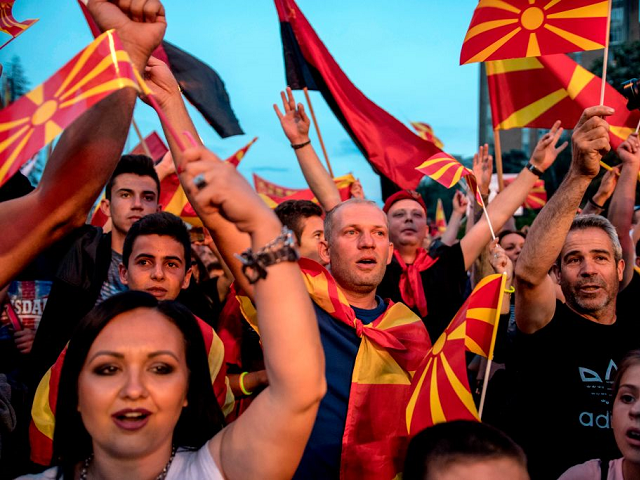The 30-year battle between Greece and Macedonia over what the Republic of Macedonia should be called appeared to conclude on Tuesday with an agreement to add the word “North” to its name.
Unfortunately, the Greek opposition promptly filed a no-confidence motion against Prime Minister Alexis Tsipras, while the Macedonian president declared he has no intention of signing the deal his own prime minister negotiated.
The dispute might seem incredibly petty compared to North Korean nuclear weapons or hot wars in the Middle East, but it is a very serious matter for Greece and Macedonia, with consequences far beyond wounded national pride on both sides. The uncertain status of Macedonia’s name has prevented it from joining international organizations such as the European Union and NATO since the 1990s when the new Macedonia broke away from the disintegrating Yugoslav federation.
The new country was obliged to adopt the unwieldy name of “The Former Yugoslav Republic of Macedonia” when it was admitted to the United Nations. Its official acronym is FYROM. The name has very few fans.
The problem is that Greece includes a province called Macedonia, and the Greeks are extremely proud of it. They consider Macedonia’s historic architecture and the legacy of its most famous son, Alexander the Great, part of the very “soul” of Greece. The Former Yugoslav Republic of Macedonia is also very keen on Alexander, employing a symbol of his dynasty as an element of its national flag.
The dispute is about more than branding and cultural appropriation. The Greeks are worried that if FYROM gets to call itself “Macedonia,” it will someday lay claim to the territory in Greece that also bears that name. For their part, the Former Yugoslavian Macedonians believe it would be an unacceptable national humiliation if they were forced to change their name.
The international community heaved a great sigh of relief on Tuesday when Greek Prime Minister Alexis Tsipras and Macedonian Prime Minister Zoran Zaev announced that Zaev’s country would now be called “the Republic of North Macedonia.”
Zaev said the name was “honorable and geographically precise,” while Tsipras declared himself happy to have “a good deal which covers all the preconditions set by the Greek side.”
Tsipras further noted that 140 nations already recognize Zaev’s country as simply “Macedonia,” so making it the “Republic of North Macedonia” is the best compromise between respecting the interests of Greece and maintaining international order.
The United Nations was relieved to see the name dispute settled at last. UN envoy Matthew Nimetz “warmly welcomed” the announcement by Tsipras and Zaev, congratulated them for resolving their differences, and anticipated a “period of enhanced relations between the two neighboring countries and especially between their people.”
The U.S. State Department enthusiastically congratulated Tsipras and Zaev on their “historic agreement” and praised their “vision, courage, and persistence in their pursuit of a mutually acceptable solution.”
NATO’s optimism was more guarded, as Secretary-General Jens Stoltenberg pointedly avoided using the “Republic of North Macedonia” name while congratulating Tsipras and Zaev for coming up with it.
“This historic agreement is a testament to many years of patient diplomacy, and to the willingness of these two leaders to solve a dispute which has affected the region for too long. I now call on both countries to finalize the agreement reached by the two leaders. This will set Skopje on its path to NATO membership. And it will help to consolidate peace and stability across the wider Western Balkans,” said Stoltenberg, referring to Zaev’s country only by the name of its capital.
Alas, the agreement hailed by Stoltenberg did not prove to be a lasting testament to patient diplomacy. Within hours, Macedonian President Gjorge Ivanov completely rejected the deal struck by his own prime minister.
“My position is final and I will not yield to any pressure, blackmail or threats,” Ivanov insisted.
In Greece, opposition leader Kyriakos Mitsotakis announced on Thursday that he would call for a vote of no confidence in Tsipras, the first such threat leveled against the prime minister since he took office in 2015. The vote will probably be taken on Friday or Saturday.
“I have an obligation before the Greek people to try to avert the mortgaging of our country’s future with an agreement that is detrimental to our national interests,” Mitsotakis said.
The Washington Post speculated on Thursday that the fate of Tsipras’ government could be in the hands of nationalist Defense Minister Panos Kammenos, who is the head of the Independent Greeks party. Kammenos has expressed opposition to the Macedonia deal, but might not be ready to bring down the government with a no-confidence vote.
As for Greek public opinion, a front-page graphic published by the right-wing tabloid Makeleio showed Tsipras, his foreign minister, and Greek President Prokopis Pavlopoulos getting executed by firing squad for agreeing to the Macedonian name. The prosecutor’s office in Athens ordered an emergency investigation of the paper for inciting violence and insulting President Pavlopoulos – who happens to belong to the same opposition New Democracy party as Kyriakos Mitsotakis, the angry legislator trying to bring Tsipras down with a no-confidence vote.
Mitsotakis made much of Tsipras’ weak grip on power and shaky poll numbers when arguing that the prime minister simply lacked the authority to make a deal with Zaev. Tsipras and his Syriza party are currently running about 10 points behind New Democracy in the polls, with Mitsotakis seen as likely to become the next prime minister. It is possible that elections will be held in Greece this year, but more likely that they will be delayed until 2019.

COMMENTS
Please let us know if you're having issues with commenting.